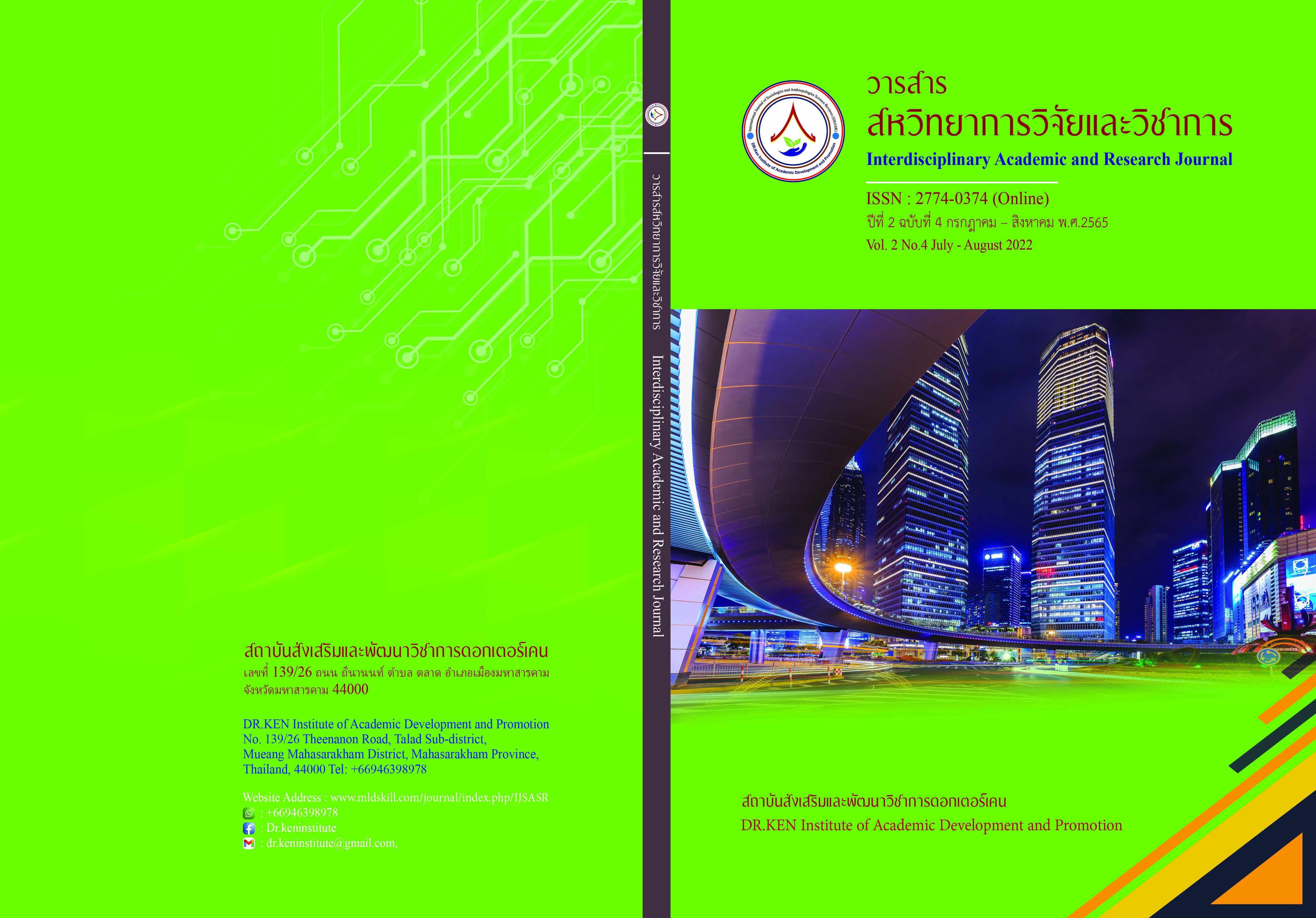The Effect of Mindfulness-based Social Treatment Group on Family Relationships in Adolescents with Attention Deficit Hyperactivity Disorder
DOI:
https://doi.org/10.14456/iarj.2022.49Keywords:
Mindfulness as a Base; Stop-see-know; , ADHD; , Social Therapy; , Family RelationshipsAbstract
Family relationships in adolescents with ADHD are preventive factors and risk factors for mental health problems and succeed in life. Adolescents with ADHD often lack of inhibition and impulsivity which makes them easy to have conflict in family relationships. Current studies have found that mental training has a positive effect on mental health problems, improving emotional brain function. However, in Thailand, no program directly focuses on this issue. Thus, this study was conducted for a purpose of developing a mindfulness-based social therapy group program on family relationships among ADHD adolescents and to study the effect of a mindfulness-based social therapy group program on family relationships of parents and adolescents with ADHD.
Materials and methods: This study used a research and development process with 3 R&D cycles, 6 steps, and 5 stakeholders: 2 child and adolescent psychiatrists, 2 social workers, and 1 lecturer in the Department of Psychology. The experimental program consisted of 10 people, consisting of 5 adolescents with ADHD and 5 parents. The sample used in the experiment was 40 people, consisting of 20 adolescents with ADHD and 20 parents, divided into the experimental group of 20 and A control group of 20 people. The research instruments consisted of 1) a mindfulness-based social therapy group program, 2) a programmed consistency observation form, 3) a program evaluation form, and 4) a functional disability assessment questionnaire for children and adolescents. suffering from ADHD Perform data analysis to develop programs by analyzing program consistency and content validity. The qualitative data analysis was based on the content analysis method. The quantitative data analysis used descriptive statistics and reference statistics.
Results: The mindfulness-based social therapy group program consisted of three key components: 1) core activities, 2) reflexive activities, and 3) outcomes. The results of the Total Conformity and Correspondence Analysis (S-CVI) were analyzed by five experts. people, the value was 0.95. The overall opinion of 6 social workers on the program was at the highest level at 4.75 (=4.75, SD=0.48). The results of the mindfulness-based group social therapy program were found. It was found that the experimental group with ADHD adolescents after using the mindfulness-based social therapy group program had a statistically significant improvement in family relationship scores at the.01 levels (F=15.6479**, p<.01). The family relationship after the experiment was significantly better than that of the control adolescents with ADHD at the.01 levels (t=3.0997**, p<.01).
Conclusion The mindfulness-based social therapy group program is content-based and appropriate for adolescents with ADHD. and improve family relationships among ADHD teenagers.
References
กระทรวงสาธารณสุข. (2564). กลุ่มรายงานมาตรฐาน, การเข้าถึงระบบบริการสุขภาพจิต: ร้อยละของผู้ป่วยโรคสมาธิสั้นเข้าถึงบริการ. [Online] สืบค้นเมื่อ 15 มกราคม 2564 จาก: https://hdcservice.moph.go.th/hdc/reports/report.php?
source=pformated/formatg.php&cat_id=ea11bc4bbf333b78e6f53a26f7ab6c89&id=e0678b73197151b3f181edcb0ee76b97
กิตติยา วงษ์ขันธ. (2561). รูปแบบการวิจัยและพัฒนา (R&D) และ รูปแบบการวิจัยเชิงปฏิบัติกาแบบมีส่วนร่วม (PAR). [Online] สืบค้นเมื่อ 31 มกราคม 2564 จาก: https://www.ubu.ac.th/web/files_up/08f2018072012262188.pdf
ทวีทวีศิลป์ วิษณุโยธิน, โชษิตา ภาวสุทธิไพศิฐ, พรทิพย์ วชิรดิลก, พัชรินทร์ อรุณเรือง, ธันวรุจน์ บูรณสุขสกุล. (2013). ความชุกโรคสมาธิสั้นในประเทศไทย. Journal of Mental Health Thai. 2013, 21 (2), 66-75.
มนธิชา ทองหัตถา. (2564).สภาพการจัดการเรียนรู้แบบออนไลน์ในสถานการณ์การแพร่ระบาดของโรคติดเชื้อไวรัสโคโรนา 2019 (COVID-19) ของครูกลุ่มสาระการเรียนรู้ภาษาต่างประเทศ โรงเรียนปากพนัง จังหวัดนครศรีธรรมราช. วารสารลวะศรี มหาวิทยาลัยราชภัฏเทพสตรี. 5 (1), 43-52.
รุ่งอรุณ กระแสร์สินธ์, อารีย์ ประจวบเหมาะ, ใกล้รุ่ง กระแสร์สินธุ์, วทัญญู รัศมิทัต, สุรสิทธ์ อุดมธนวงศ์. (2564). ปัจจัยที่มีผลกระทบต่อการเรียนการสอนแบบออนไลน์ของคณะบริหารธุรกิจสถาบันเทคโนโลยีไทย-ญี่ปุ่น. วารสารนิติบุคคลบริหารและนวัตกรรมท้องถิ่น, 7 (8), 237-252.
วนัญญา แก้วแก้วปาน. (2560). สัมพันธภาพครอบครัวกับปัญหาการกระทำผิดในวัยรุ่น. Veridian E-Journal Silpakorn University, 10 (1) 361-371.
สมนึก อนันตวรวงศ์. (2559). โปรแกรมสติบำบัดสำหรับเด็กสมาธิสั้น. บริษัทสยามพิมพ์นานา จำกัด.
สุพร อภินันทเวช. (2559). การรักษาโรคสมาธิสั้นและจิตสังคมบำบัดในประเทศไทย. เวชบันทึกศิริราช, 9 (3), 175-181.
Brakley, R. A., (2006). Attention Deficit Hyperactivity Disorder. A handbook for Diagnosis and Treatment. 3rd edition, The Guklford press. New York, 2006.
Branhmbhatt, K., Hilty, D.M., Mina Hah., Jaesu Han., Angkustsiri, K. & Schweitzer J. (2016). Diagnosis and Treatment of ADHD during Adolescence in The Primary Care Setting: Review and Future Directions. J Adoles Health, 59 (2), 135-143. Doi: 10.1016/j.jadohealth.2016.03.025
Dunning, D. L., Griffiths, K., Kuyken, W., Crane, C., Foulkes, L., Parker, J., & Dalgleish, T. (2019). Research review: The effects of mindfulness‐based interventions on cognition and mental health in children and adolescents—A meta‐analysis of randomized controlled trials. Journal of Child Psychology and Psychiatry, 60 (3), 244-258. https://doi.org/10.1111/jcpp.12980
Harpin V.A. (2005). The effect of ADHD on the life of an individual, their family, and community from preschool to adult life. Arch Dis Child 2005, 90 (Suppl I) : i2–i7. doi: 10.1136/adc.2004.059006
Haydicky, Jillian & Shecter, Carly & Wiener, Judith & Ducharme, Joseph. (2013). Evaluation of MBCT for Adolescents with ADHD and Their Parents: Impact on Individual and Family Functioning. Journal of Child and Family Studies. 24 (1), 76-94, DOI: 10.1007/s10826-013-9815-1
Punyapas, S., & Boon-yasidhi, V., (2015). Reliability and Validity of Weiss Functional Impairment Rating Scale (WFIRS)-Thai version in Children and Adolescents with Attention Deficit Hyperactivity Disorder. J Psychiatr Assoc Thailand, 60(2), 111-126.
Saltzman, A., & Goldin, P. (2008). Mindfulness-based stress reduction for school-age children. In L. A. Greco & S. C. Hayes (Eds.), Acceptance and mindfulness treatments for children and adolescents: A practitioner's guide (pp. 139–161). New Harbinger Publications.
Siegel, D. J., & Hartzell, M. (2003). Parenting from the inside out: how a deeper self-understanding can help you raise children who thrive. New York: J.P. Tarcher/Putnam.
Thomas P.A., Hui Liu, Umberson D., (2017). Family Relationships and Well-Being. The gerontological: Innovation in Aging. 1 (3) 1-11. DOI:10.1093/geroni/igx025
Downloads
Published
How to Cite
Issue
Section
License
Copyright (c) 2022 Sommuek Anantavorawong

This work is licensed under a Creative Commons Attribution-NonCommercial-NoDerivatives 4.0 International License.
Copyright on any article in the Interdisciplinary Academic and Research Journal is retained by the author(s) under the under the Creative Commons Attribution-NonCommercial-NoDerivatives 4.0 International License. Permission to use text, content, images, etc. of publication. Any user to read, download, copy, distribute, print, search, or link to the full texts of articles, crawl them for indexing, pass them as data to software, or use them for any other lawful purpose. But do not use it for commercial use or with the intent to benefit any business.
















.png)


